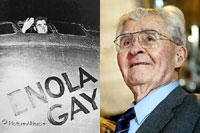Hiroshima bomber dies at 92
Paul Tibbets, who was the pilot of B-29, that dropped the atomic bomb on Hiroshima, died at the age of 92 (photos).

Tibbets died Thursday at his Columbus home after a two-month decline caused by a variety of health problems, said Gerry Newhouse, a longtime friend.
Throughout his life, Tibbets seemed more troubled by other people's objections to the bomb than by having led the crew that killed tens of thousands of Japanese in a single stroke. The attack marked the beginning of the end of World War II.
Tibbets grew tired of criticism for delivering the first nuclear weapon used in wartime, telling family and friends that he wanted no funeral service or headstone because he feared a burial site would only give detractors a place to protest.
And he insisted he slept just fine, believing with certainty that using the bombs on Hiroshima and Nagasaki saved more lives than they erased because they eliminated the need for a drawn-out invasion of Japan.
"He said, 'What they needed was someone who could do this and not flinch _ and that was me,"' said journalist Bob Greene, who wrote the Tibbets biography, "Duty: A Father, His Son, and the Man Who Won the War."
"I'm not proud that I killed 80,000 people, but I'm proud that I was able to start with nothing, plan it and have it work as perfectly as it did," he said in a 1975 interview.
"You've got to take stock and assess the situation at that time. We were at war. ... You use anything at your disposal."
He added: "I sleep clearly every night."
Former U.S. Sen. John Glenn, a former Marine fighter pilot, said people who criticized Tibbets for piloting the plane that dropped the bomb failed to recognize that an allied invasion of Japan , which the bomb helped avert, would have resulted in the deaths of several million people.
"It wasn't his decision. It was a presidential decision, and he was an officer that carried out his duty," Glenn said. "It's a horrible weapon, but war is pretty horrible, too."
The head of the Japan Congress Against A- and H-Bombs rejected the idea that the bombing saved lives.
"What Mr. Tibbits did should never be forgiven," said Takashi Mukai, whose mother, a nurse, suffered lifelong effects of radiation as she treated bombing victims. "His actions led to the indiscriminate killing of so many, from the elderly to young children.
"Nevertheless, I would like to express my condolences to his family, and pray for his soul," he said. "What's important now is that we move toward a world free of nuclear weapons."
Paul Warfield Tibbets Jr. was born Feb. 23, 1915, in Quincy, Illinois, and spent most of his boyhood in Miami . He was a student at the University of Cincinnati's medical school when he decided to withdraw in 1937 to enlist in the Army Air Corps.
"I knew when I got the assignment it was going to be an emotional thing," Tibbets told The Columbus Dispatch for a story on the 60th anniversary of the bombing. "We had feelings, but we had to put them in the background. We knew it was going to kill people right and left. But my one driving interest was to do the best job I could so that we could end the killing as quickly as possible."
Tibbets, a 30-year-old colonel at the time, and his crew of 13 dropped the five-ton "Little Boy" bomb over Hiroshima the morning of Aug. 6, 1945 . The blast killed or injured at least 140,000.
Three days later, the United States dropped a second atomic bomb on Nagasaki, killing at least 60,000 people. Tibbets did not fly in that mission. The Japanese surrendered a few days later.
Tibbets retired from the Air Force as a brigadier general in 1966. He moved to Columbus , where he ran an air taxi service until he retired in 1985.
Tibbets again defended the Hiroshima bombing in 1995, when an outcry erupted over a planned 50th anniversary exhibit of the Enola Gay at the Smithsonian Institution.
The museum had planned to mount an exhibit that would have provided the context of the bombing, but veterans groups objected that it paid too much attention to Japan 's suffering and underestimated the number of Americans who would have perished in an invasion by Japan . Tibbets denounced it as "a damn big insult."
The museum changed its plan, and agreed to display the fuselage of the Enola Gay without commentary, context or analysis.
Tibbets is survived by his wife, Andrea, and three sons, Paul, Gene and James, as well as a number of grandchildren and great-grandchildren. A grandson named after Tibbets followed his grandfather into the military as a B-2 bomber pilot currently stationed in Belgium .
Subscribe to Pravda.Ru Telegram channel, Facebook, RSS!


